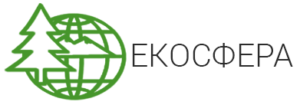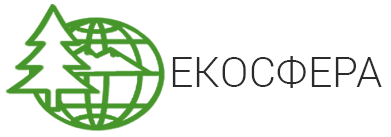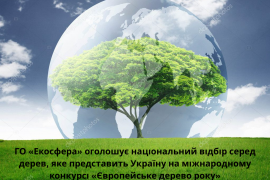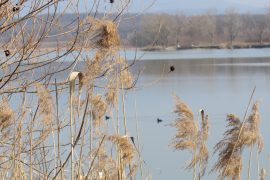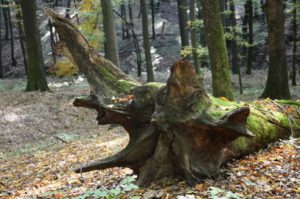
Deadwood (i.e. veteran trees, standing dead or dying trees, fallen logs and branches, decaying biomass) is a critical component in forest structure and its functioning, playing a key role for maintaining forest productivity, natural regeneration, biodiversity conservation, increase resilience to climate change and enhance provision of ecosystem services to local communities and public in general. Thus, adequate management of deadwood brings an important contribution to sustainable forest management and clearly contributes to mitigation of some of the impacts of climate change.
However, deadwood management is a relatively new conservation concept for Romania and Ukraine barely promoted since the years 2000 and which is yet, most often not understood in practice. For decades, forestry governance in Romania and Ukraine considered deadwood to be an “enemy of the forest” and efforts were put into systematically removing it from forests through forestry operations, following forestry norms and regulations (e.g. sanitary feelings, harvesting rules). This has led to the disappearance of certain valuable species from forest ecosystems (e.g. Dendrocopos leocotus) unbalancing the ecosystem and leading to vulnerabilities related to capacity for natural regeneration of forests, ensuring soil nutrients, climate change resilience, and thus contributing to negative economic impact. These vulnerabilities have ultimately led to additional costs for the installation or completion of artificial forests, and interventions to ensure socio-ecological balance (works to prevent and / or combat pests, reduce the bonity of the forest soil, solve the lack of edible mushroom species important to the local economy).
Breaking up the myth about deadwood (something to be removed from forests as a necessary part of “correct” forest management since dead trees were supposed to harbor disease) via joint project cooperation and research between Romania and Ukraine throughout the project, is thus essential to preserve healthy forest ecosystems and the ecosystem services they provide.
The Project ”Promote deadwood for resilient forests in the Romanian-Ukrainian cross-border region (RESFOR)” is a trans-boundary research project in the forestry domain, particularly on the issue of deadwood, as an important element:
I) in securing forests productivity, the biodiversity of forest ecosystems, and ecosystem services valuable for local communities; and,
ii) in improving forests resilience to climate change.
Also, an important component within the project is the communication and promotion of results.
PROJECT SPECIFIC OBJECTIVES:
- To enable framework conditions for cooperation, innovation and research on the topic of harmonized responsible forestry practices for deadwood management.
- To achieve acknowledgment on the importance of deadwood management, and to demonstrate an innovative approach for increasing forest resilience by implementing best practices for deadwood management in production forests in the project target area.
- To ensure promotion and sustainability of scientific research results on forest ecosystems’ long-term productivity and resilience to climate change, via building capacity and expertise of final beneficiaries, performing advocacy work, and creating the preconditions for specific research continuation.
RESULTS:
- A cross-border network of researchers and experts has been set up, which includes 32 researchers and experts from Romania and Ukraine. The network operates in the target area of the project in order to ensure long-term cooperation in the field of responsible forest management.
- A study was conducted in the economic and protected forests of the Ukrainian-Romanian cross-border region of the Carpathians. Trial areas have been laid, cores have been taken to study annual tree rings and the influence of climatic factors on the size of annual tree growth in forests where forestry is carried out and in forests where economic activity is limited. Recommendations for best practices in dead wood management in forests have been developed.
- A summer children’s camp was held to raise awareness of schoolchildren on the role of deadwood in forests. A textbook for children “Why the forest needs deadwood?” has been published.
- A 3-day seminar was held for students of the Faculty of Biology of Uzhhorod National University in the virgin forests of the Uhols`ko-Shyrokoluzhanskyi virgin forest massif of the Carpathian Biosphere Reserve on the topic “Deadwood. Why forest needs it?”. The section on dead wood was included in the working curriculum of the discipline “ecosystem mapping and assessment of their ecosystem services”. Developed and published a textbook “Dead wood as a component of forest ecosystems”.
- A number of public events were held – thematic seminars on nature on the basis of ancient forests of Uzhansky National Nature Park for stakeholders and information seminars for the public and journalists.
- The public was informed about the importance of dead wood in the forests of the Carpathians through the Facebook page of the NGO “Ecosphera”, on Instagram, on the NGO`s website, and in the media:
https://ekosphera.org/en/mertva-derevyna-cze-najbagatshyj-biotop-u-zdorovomu-lisi/
https://ekosphera.org/en/na-zakarpatti-provely-navchalno-praktychnyj-seminar-na-temu-mertva-derevyna-chomu-vona-potribna-lisu/
PROJECT DURATION AND AREA OF IMPLEMENTATION:
The project has a total duration of 1,5 years (18 months), starting from 1st January 2020 until 30th June 2021.
Project objectives, activities, and expected results are related to the project target area in Romania (Maramures and Suceava counties) and Ukraine (Ivano Frankivsk and Zakarpattia regions).
PARTNERS:
The project is implemented by the partnership between WWF Romania – Danube Carpathian Programme, Maramures Branch, and “Stefan cel Mare University” of Suceava in Romania, the Research Institute of Mountain Forestry P.S. Pasternak and Ecosphera in Ukraine.
FINANCIER:
The European Community through the European Neighborhood Instrument, Joint Operational Program Romania-Ukraine 2014-2020.
The value of the project is 324942.5 euros (1562973.425 lei), of which the European Union contribution is 292448.25 euros (1406676.08 lei). EMS-ENI code: 2soft / 1.2 / 13.
This material was created and maintained with the financial support of the European Union. Its content is the sole responsibility of the beneficiary and does not necessarily reflect the views of the European Union.
Partners logo

